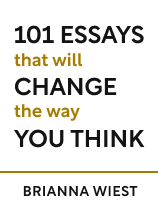

This article is an excerpt from the Shortform book guide to "101 Essays That Will Change the Way You Think" by Brianna Wiest. Shortform has the world's best summaries and analyses of books you should be reading.
Like this article? Sign up for a free trial here .
Do you have a feeling you’re pursuing the wrong goals? Why would you make decisions and choose goals that waste your energy and make you unhappy?
Many people chase after the wrong goals—pursuing things for the sake of getting social approval. While impressing others may feel good in the short term, it will eventually make you feel miserable and unfulfilled.
Here’s why chasing after superficial goals is the worst kind of self-sabotage.
You Pursue the Wrong Goals
Wiest argues that your reliance on positive feedback compels you to focus more on how you’re perceived by others and less on how you really feel. She explains that your preoccupation with appealing to others makes you unhappy due to the following reasons:
- It motivates many of your decisions and goals—meaning that you spend most of your energy doing things to please or impress others. For example, you wanted to be a nurse but your parents wanted you to become a neurosurgeon because it sounded more impressive to them. So, you dedicated years of extra training to become a neurosurgeon instead of pursuing your desired path.
- It prevents you from thinking about what your unique needs are and what you need to feel satisfied and happy—meaning that you spend a lot of energy doing things that don’t satisfy you or make you happy. For example, being a neurosurgeon leaves you joyless and unfulfilled, but you won’t quit because you fear losing the admiration you’ve worked so hard to attain.
(Shortform note: One way to judge if your goals align with your needs is to consider your motivations. Some experts believe that all behavior is driven by the need to fulfill one of two motivation types: intrinsic or extrinsic. Intrinsic motivation comes from within: You accept your needs and feel comfortable expressing them by engaging in activities that make you happy. For example, you choose a career you enjoy and aren’t worried about how others judge you. Extrinsic motivation comes from your environment: You ignore your needs in favor of seeking acceptance from others by engaging in activities that encourage external rewards. For example, you choose a career you don’t enjoy because it garners admiration and positive feedback.)
Achieving Wrong Goals Makes You Feel Unfulfilled
According to Wiest, you chase after the wrong goals because you believe that happiness comes from having a life that appears perfect to others—and you make decisions and set goals to achieve your vision of this ideal life.
However, Wiest argues, your vision of an ideal life is simply a response to the way that you’ve been conditioned to please others. Unfortunately, conforming to what others want rarely satisfies your true emotional needs. Instead, it leaves you unhappy and unfulfilled and puts you in a never-ending cycle of “improving” and changing yourself to please those around you.
Further, because this conditioning is so deeply ingrained in you, you fail to question why your achievements aren’t making you happy. Instead, you assume that you just haven’t done enough to deserve happiness and that you need to be, do, or acquire something more—for example, by making yourself more attractive, acquiring more possessions, or achieving a higher status.
| The Desire for Positive External Feedback Motivates Status Goals The Tao Te Ching, one of the ancient foundational texts of Taoism, clarifies how seeking positive feedback influences your goals and leads to a never-ending cycle of dissatisfaction. It explains that a desire to receive positive feedback influences you to choose status-based goals, such as wealth and power, so that you can appear successful and prove your worth to others. However, status-based goals—such as more money or higher status—have no upper limit and are therefore impossible to “achieve” and drive you to always seek more. This pursuit for more prevents you from feeling happy with what you already have. Your desire to fulfill this never-ending goal and receive the feedback you crave consumes you and surpasses your desire to feel happy now. As a result, instead of tending to your emotional needs, you direct all your energy toward pursuing increasingly ambitious goals. Your assumption that achieving your goals will lead to positive feedback and happiness compels you to engage in behaviors that leave you feeling dissatisfied—such as ignoring your emotional and physical health, engaging in competitive or controlling behaviors, or acting inauthentically. |
Consequence: You Feel Powerless to Change Your Emotions
Wiest argues that suppressing your feelings and pursuing the wrong goals makes you believe that you’re powerless to change the way you feel about your experiences. As we’ve already explored, you’ve been conditioned to put your thoughts and emotions at the mercy of things outside of your control. When other people don’t give you the feedback you depend on to feel happy, or your experiences fail to live up to your ideal vision of happiness, you feel disappointed and unhappy.
Because you’ve given these external factors so much power over your happiness, you mistakenly assume that they are responsible for your happiness. And, since you’ve ceded so much responsibility for your happiness to forces you believe to be outside your control, you feel you are powerless and without agency to take responsibility for how you think and feel.
(Shortform note: Psychologists explain that ceding responsibility for your happiness makes you feel powerless because it contributes to a victim mentality—the belief that bad things happen to you through no fault of your own. A victim mentality creates feelings of apathy because feeling like external factors are thwarting you diminishes your motivation to take accountability for your feelings. Instead, people with a victim mentality often magnify their problems and their perceived injustices in an attempt to gain attention (comfort, sympathy, reinforcement of their beliefs) from others. The attention they receive from others validates their powerlessness and keeps them from changing the way they think about and respond to their experiences.)

———End of Preview———
Like what you just read? Read the rest of the world's best book summary and analysis of Brianna Wiest's "101 Essays That Will Change the Way You Think" at Shortform .
Here's what you'll find in our full 101 Essays That Will Change the Way You Think summary :
- Why the only way to make yourself feel better is to change the way you think
- How social conditioning influences the way you unconsciously think
- How to manage your thoughts and feelings about yourself and your experiences






